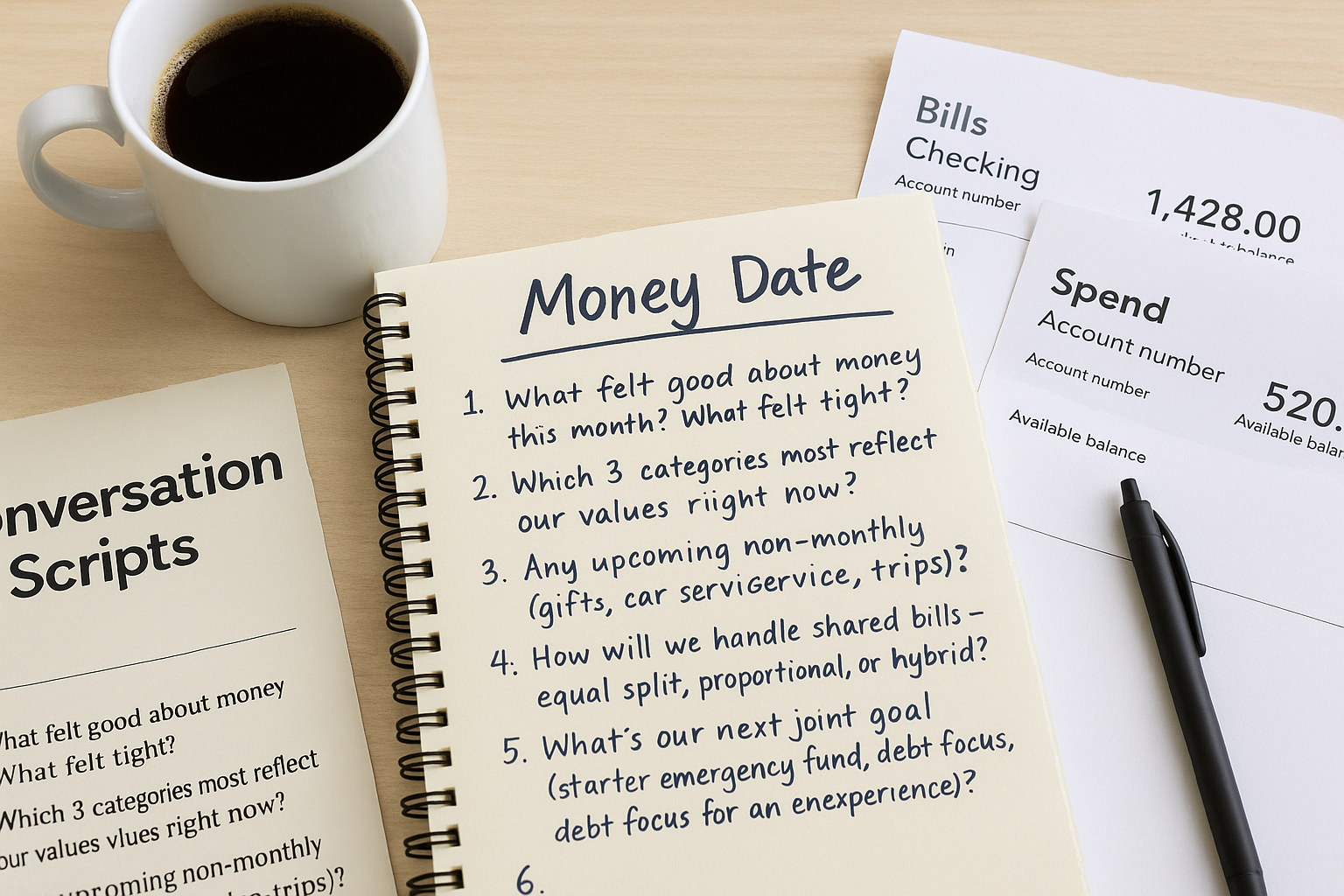Couple Money Conversation Scripts
Talking about money with someone you love doesn’t have to feel like an audit. With clear ground rules, a short agenda, and plug-and-play language, you can turn “the money talk” into a calm monthly habit that strengthens your relationship and protects your goals.
Ground Rules (read these together first)
- Schedule it—don’t ambush. Pick a neutral time and a comfy place. Put phones on do-not-disturb and set a 25-minute timer.
- Be on the same team. It’s not “me vs. you,” it’s “us vs. the problem.”
- Use “I” statements. “I feel anxious when bills are late” beats “You never pay on time.”
- Facts first, feelings always. Look at numbers, then talk about how they feel.
- Call a timeout if needed. If emotions spike, pause and reschedule within 48 hours.
The 25-Minute Money Date Agenda
- 5 minutes: Wins & worries. One quick win and one concern each.
- 10 minutes: Facts. Bills due, balances, paydays, upcoming irregular costs.
- 8 minutes: Decisions. Limits for variable spending, savings/debt moves, any changes to contributions.
- 2 minutes: Next steps. Who does what by when; schedule the next money date.
Plug-and-Play Scripts for Common Moments
1) The gentle opener
You: “Could we set a 25-minute money date this weekend? I want us to look at what’s coming up and choose a plan we both feel good about.”
2) Sharing your numbers (without shame)
You: “I want us to have the full picture so we can plan honestly. Here’s what I’m carrying: $____ on my card at __%. I’m not asking you to fix it—just to help me build a plan that works for both of us.”
3) Different incomes (equity over 50/50)
You: “Since our incomes aren’t the same, could we try proportional contributions for shared bills (e.g., 60/40) and each keep personal spending money? I want it to feel fair, not identical.”
4) When spending crept up
You: “I noticed we spent $___ more on takeout this month. I’m not blaming—can we set a weekly limit we both choose and move that amount to a ‘spend’ account every Friday?”
5) Big purchase check-in
You: “Before we buy the _____, can we talk through total cost, timing, and what we’ll trade off? I want to be excited and aligned, not stressed later.”
6) After a slip-up (repair & reset)
You: “I overspent the travel budget by $____. I’m sorry. I’ll pause non-essentials this week and move $____ from my personal money to cover it. Can we do a quick reset on Friday?”
Money Date Questions (steal this list)
- What felt good about money this month? What felt tight?
- Which 3 categories most reflect our values right now?
- Any upcoming non-monthly costs (gifts, car service, trips)?
- How will we handle shared bills—equal split, proportional, or hybrid?
- What’s our next joint goal (starter emergency fund, debt focus, or saving for an experience)?
Simple Account Structure for Fewer Fights
- Joint “Bills” Checking: Autopay rent/mortgage, utilities, insurance, debt minimums.
- Two Personal “Spend” Accounts: Weekly transfers for day-to-day purchases—no permission needed.
- Shared High-Yield Savings: Buckets for Emergency, Travel, Car, Gifts; small automatic transfers each payday.
Mini Checklist (so talks turn into action)
- Rename accounts (Bills / Spend / Emergency) so the purpose is obvious.
- Turn on alerts: low balance, large transaction, upcoming bills.
- Automate the boring stuff: transfers the day after payday; autopay for must-pays.
- Document decisions in a shared note: limits, goals, due dates, who does what.
If We Disagree, Try This
You: “It sounds like we both want security, but we’re choosing different paths. Can we try your approach for four weeks, review results, then try mine for four weeks? We’ll keep whichever works better.”
